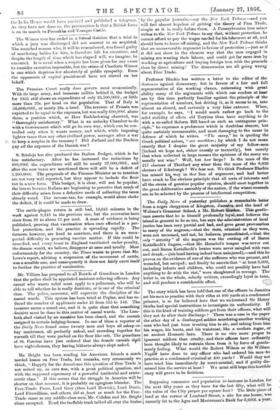Professor Blackie has written a letter to the editor of
the Scotsman against democracy, but in favour of a fair and full representation of the working classes, reiterating with great ability many of the arguments with which our readers at least are by this time perfectly familiar against the principle of the representation of numbers, but driving it, as it seems to us, into almost an absurd, and certainly a very false extreme. When, for example, he says, "I would much rather go back to the solid stolidity of effete old Toryism than have anything to do with a so-called Reform Bill based on such an outrageous prin- ciple," he expresses a preference which is doubtless sincere, but quite certainly unreasonable, and most damaging to the cause in defence of which he writes. "The many," he is quoting the Greek political axiom, "are worthless ; by which I do not mean exactly that I despise the great majority of my fellow-men [indeed we hope not, either exactly or inexactly], but merely that when collected in large masses the opinions of the many are usually not wise." Well, but how large? Is the mass of the 217 electors of Thetford any wiser than the mass of the 8,830 electors of Edinburgh? We fear not. We think Professor Blackie has missed his way in that line of argument, and had better have stuck to the obvious principle that all sorts of interests and all the strata of genuine popular opinion, should meet together in the great deliberative assembly of the nation, if the wisest counsels are to be selected by the process of intellectual competition.


































 Previous page
Previous page